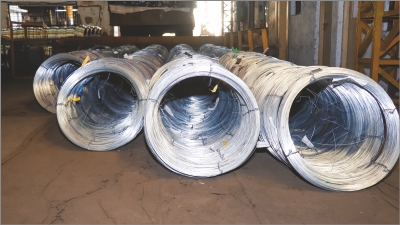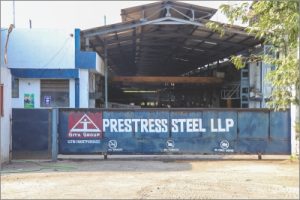Prestress Steel LLP, a member of Gita Group, is a manufacturer of top quality medium and high carbon steel wires for Infrastructure, power, automobiles and general engineering sectors, since 1994. The company currently operates 4 strategically located plants across India in Silvassa, Bajpur and Bangalore respectively; delivering an output exceeding 72,000 metric tons annually. The company is set to establish a new cold ribbed wire manufacturing plant in its Silvassa unit, with an annual production capacity of 20,000 MT, within the next few months. In a recent interaction with Wire & Cable India, Mr. Sampath Gilada, Managing Partner, Prestress Steel LLP shared about the company’s journey, manufacturing setup, production capacity, product portfolio, clientele, recent developments, his views on the current scenario of the steel wire industry, the challenges and how they can be overcome.
Wire & Cable India: Could you please take us through the business journey, milestones and achievements of your company?
Sampath Gilada: Gita Group was established in the early 1960s by the Gilada and Tapadiya families in Karnataka. The Group has four PC, galvanized and allied products and wire manufacturing units located in Silvassa (Dadra & Nagar Haveli), Bajpur (Uttarakhand) and Bangalore (Karnataka). In addition, the group also has seven sleeper units in India and two units in Africa. We also have seven PC pole manufacturing units, five pulses units, besides having a distinct infrastructure division dedicated towards water supply and road projects. Further, we have our presence in segments such as real estate, power generation, refractory manufacturing, and ductile engineering castings for railways and automobiles with a global turnover of INR 1400 crore in FY 2022-23. Prestress Steel LLP, formerly known as Prestress Wire Industries, had started during the year 1994 with the capacity of 3,500 MTPA and now, the company has grown to reach the annual production capacity of 100,000 MT with its four distinct manufacturing plants. The company has a diverse range of products such as single and stranded PC wire, ACSR core and stranded wire, special ACSR wire with 19 wire strand, earth wire, commercial galvanized, nail wire, screw wire, spring steel like bedding and shutter wires, as well as bailing wire luggage spring. Our PC wires and ACSR wires are exported to the Middle East, Bangladesh, Turkey, Africa, and European markets on a regular basis.
Watch: RR Kabel | Solar Cables | Solar Plant | Renewable Energy
WCI: Describe your infrastructure and manufacturing setup for the steel wire sector along with their manufacturing capabilities.
SG: Each of our manufacturing units are state-of-the-art, having high capacity in straight line wire drawing manufacturing having annual production capacity of 80,000 MT, along with galvanized wire pad wiping facility and eco friendly pickling and furnaces along with solar rooftop photovoltaic plants as well as Rainwater harvesting capabilities. All of the units are ISO 14001, OHSAS and BIS-approved, ensuring the satisfaction of our customers with respect to the quality of the products. At present, we are operating in the northern, southern and western region in India and moving forward, we are looking to establish our presence in the Eastern region as well.
WCI: Brief us about your specialized products along with their USPs.
SG: Prestress steel LLP is the sole manufacturer in India of specialized ACSR conductors having mega high strength with tensile strength of 1600-2400 MPa according to BSEN 50189, ASTM B 957, IEC 60888 & IEC 63248 which are used extensively in HTLS/ GAP type conductors. Prestress Steel LLP is also catering to specialized spring steel requirements of sizes ranging from 1.40mm to 8.00mm for mattress manufactures as well as bags or suitcase manufacturers all over India and in Middle East, Bangladesh, Turkey, Africa and the European markets. The unique selling point of these products is that they are import substitutes, having high quality with reasonable costs.
WCI: What have been the recent developments at your organization and what are your future growth plans?
SG: Prestress Steel LLP is coming up with a cold ribbed wire manufacturing plant in our Silvassa unit, having an annual production capacity of 20,000 MT, within the next few months. Cold ribbed wire is an alternative to the traditional TMT bars for concrete reinforcement. Cold ribbed wires use thinner sections for the same in TMT bars. For example, 8mm TMT bars can be replaced with 7mm cold ribbed wires having better tensile strength than TMT bars while also offering significant savings in steel (22-28%) and overall reduction in cost of construction (5-8%). Prestress Steel LLP will be offering FE 550 grade of cold ribbed wires compared to the existing FE 415 grade of TMT bars.
WCI: Share with us about your major projects and clientele you are catering to.
SG: The projects we are involved in are the construction of bridges, dams and national highways. Our prestressed concrete poles are used for power transmission. Our PC pipes are used for water supply schemes and drainage systems. Our concrete railway sleepers are RDSO approved, and our G.I wires are used in conductors such as ACSR conductors. Our spring steel is used in automobiles, mattresses, bags, general engineering etc, and our mild steel G.I wires are used in various applications such as fencing, agriculture, poultry etc. Our major clients are Sterlite technologies, Apar Industries, Indian Railways, VIP Accessories, Midal Cables, Power Grid, Vishal Nirmiti Private Limited, and others.
Also Read: H. D. Wire to Foray into Fencing Products Segment: Value Added Products Made from In-House Manufactured Wires
WCI: Please share your views on the Indian vis-a-vis the global stainless steel wire industry. What is the role of the Indian government in the growth of this sector?
SG: The steel wire industry is a basic infrastructure industry producing various types of steel wires, which have high-end critical applications in infrastructure, auto industry, power distribution, defense and other critical industries. The growth of this industry is directly linked to the growth of the infrastructure, automobile and power sectors. The new National Steel Policy enshrines the long-term vision of the government to give impetus to the steel sector. It seeks to enhance domestic steel consumption and ensure high-quality steel production and create a technologically advanced and globally competitive steel industry. The government has also announced a policy for providing preference to domestically manufactured iron and steel products in government procurement. The government has also approved a Production Linked Incentive (PLI) Scheme for Specialty Steel. It is expected that specialty steel production will become 42 million tonnes by the end of 2026-27.
WCI: What are the major ongoing challenges in the Indian stainless steel wire industry?
SG: Currently, the quality of wire rod manufactured by Indian manufacturers is not comparable to European and Japanese Standards which ultimately affects the quality of finished wires produced in India. India also has to increase the exports of steel, galvanized steel products and especially specialty steel and capture the market of Japan, Korea, China and other European countries. Finances being expensive in India compared to other countries, including China, Korea, and Japan, a part of the inflated cost invariably devolves into product costs, close to USD 40.00 per ton, making the final product expensive and thus uncompetitive. Add to that the problem of steel having a cyclical demand in India. The monsoons put the brakes on construction, the primary consumer of steel. As we are a developing economy we also have low per capita consumption. Furthermore, steel-making is a power-intensive business, and India is a power-deficit country despite a large number of PPAs being signed in the mid-90s and early 2000s. The deficiency of electricity puts India at a disadvantage when it comes to producing steel the way it wants to. There might be some respite with the right mix of renewables and thermal power.
“ The steel wire industry has high-end critical applications in infrastructure, auto industry, power distribution, defense and other critical industries. The growth of this industry is directly linked to the growth of the infrastructure, automobile and power sectors. ”
WCI: How can these challenges of the industry be addressed?
SG: In recent years, the Government has passed reforms for the growth of the steel industry in India. The Government allowed 100% FDI through automatic route for the steel sector in India. The NSP 2017 Policy was launched, aimed to create a well-developed and highly competent steel industry to boost economic growth through measures such as meeting steel demand domestically through availability of raw materials and capacity additions and in a cost-effective manner. The Government notified the SSRP to provide guidelines for metal scrapping centers in India. The framework provides guidelines on scrap segregation, collection, processing, etc. in a scientific manner.
This is to recycle and reuse scrap to produce high quality steel. This will ensure more steel production and, thus, reduce dependency on imports. The PLI for Specialty Steel Scheme by the government aims to promote manufacturing of specialty steel in India through capital investment, employment generation and technology upgradation, thus, reducing dependence on imports in meeting the domestic demand. The Steel and Steel Products (Quality Control) Order policy was enacted to maintain quality control and ensure quality steel products to consumers through the adoption of Quality Control Orders (QCOs) which made BIS Standards mandatory. These measures are helping to provide an impetus to India’s steel industry and thus, helping boost economic growth of India.







